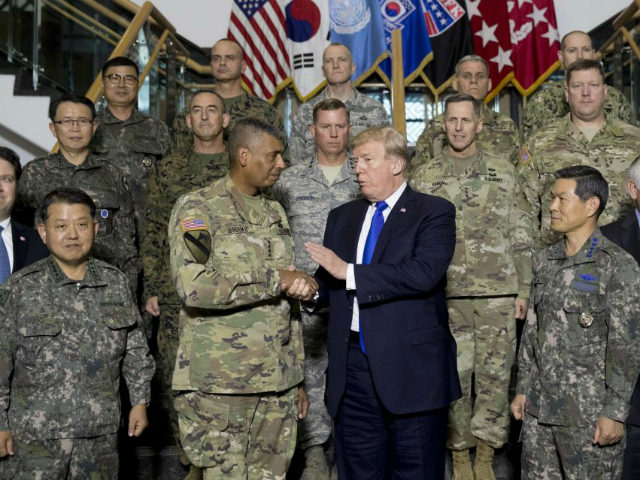The South Korean government on Tuesday appointed a career diplomat named Lee Tae-woo to head up rushed negotiations for the renewal of a defense agreement with the U.S. that will not expire for two years.
Former President Donald Trump has notably called for South Korea to increase its contributions by 500 percent; the South Korean government’s moves to ensure that the agreement will remain as-is far beyond the 2024 American presidential election could be interpreted as a way to prepare for Trump’s potential return to the White House.
The Special Measures Agreement (SMA) covering U.S. contributions to South Korea’s defense has been renewed 11 times since 1991, most recently in April 2021, when a deal lasting until 2025 was sealed.
Under the eleventh SMA, the administration of former President Moon Jae-in agreed to a 13.9-percent increase in the amount paid to keep American troops in South Korea. This marked the first time Seoul’s contribution had increased by more than ten percent in a single round of the SMA and the first time it paid more than a billion dollars.
In the final year of his administration, Trump rejected South Korea’s offer of a 13-percent increase. Trump felt South Korea was taking advantage of American protection, paying a pittance when its huge economy would allow it to handle a much heavier share of the costs.
“This is a very strong alliance we have, but Korea is a wealthy country and could and should pay more to help offset the cost of defense,” Trump’s Defense Secretary Mark Esper said in November 2019 after meeting with his South Korean counterpart, Jeong Kyeong-doo.
Esper added that most of the funding in question is spent in South Korea to cover the cost of U.S. troops living in the country, so the money would stay in Korea rather than being sent to the United States.
Although Jeong and Esper refused to specify a figure, South Korean media reported that Trump wanted Seoul to pay $4.7 billion in 2020. South Korea was paying about $830 million at the time.
Negotiations remained deadlocked until March 2021, when an agreement in principle was announced, including what the U.S. State Department described as a “meaningful increase” from South Korea covering the next five to six years. The SMA ended up lasting until 2025 when it was finalized.
The Diplomat reported in March 2021:
The breakdown in talks led to real-world consequences, as approximately 45 percent of Korean employees working for the USFK [United States Forces Korea] had to be furloughed due to the failure to reach an agreement last year. Without an agreement in place, the South Korean government and National Assembly had to come together to pay the workers temporarily by enacting a new law and issuing executive orders.
The hasty appointment of Lee as Seoul’s new chief negotiator, two years ahead of schedule, seemed to “reflect concerns regarding the potential re-election” of Trump, as Korea JoongAng Daily put it on Tuesday.
When his appointment was announced, Lee said:
Although we have a heavy responsibility on our shoulders, we will do our best to achieve a reasonable level of defense cost-sharing through future negotiations to provide stable housing conditions for U.S. troops stationed in Korea, an important pillar of the South Korea-U.S. joint defense posture.
South Korea traditionally sent defense officials to the first few rounds of SMA negotiations, but under Moon, the head of the delegation was an economist. Lee, formerly a counselor at the South Korean embassy in Washington, will head up a negotiating team that includes staff from the ministries of foreign affairs, the economy, and defense.
South Korean media reported in January that the administration of President Yoon Suk-yeol was interested in starting SMA negotiations before the 2024 U.S. presidential election, but the South Korean Foreign Ministry refused to comment on those reports or confirm that Seoul wanted a new agreement in place before Trump could return to office.

COMMENTS
Please let us know if you're having issues with commenting.